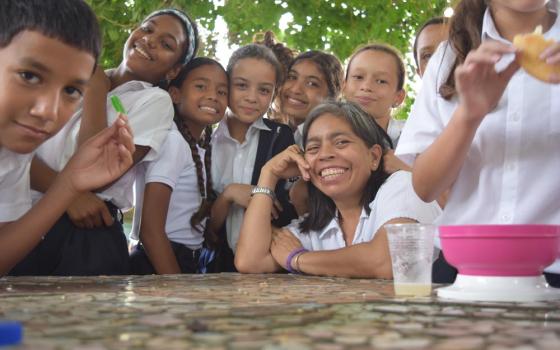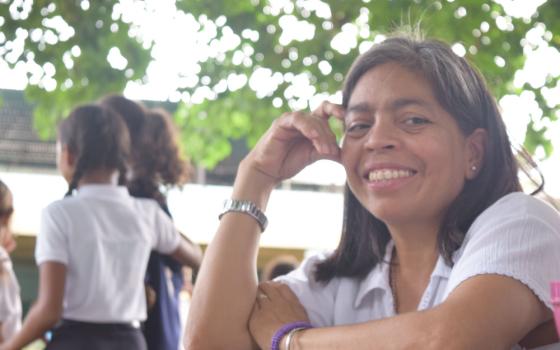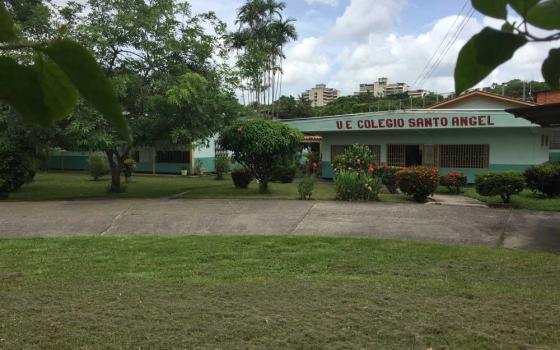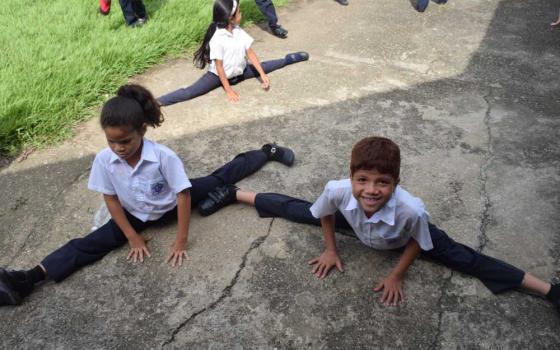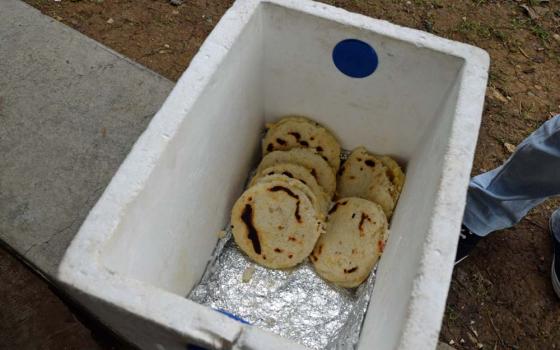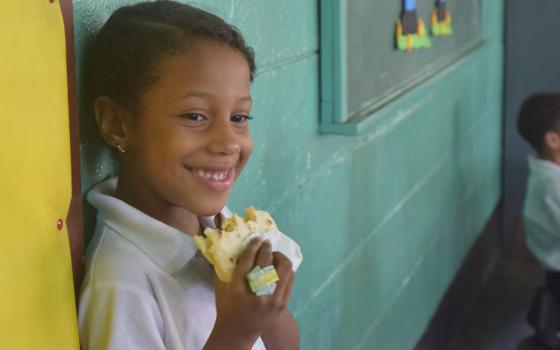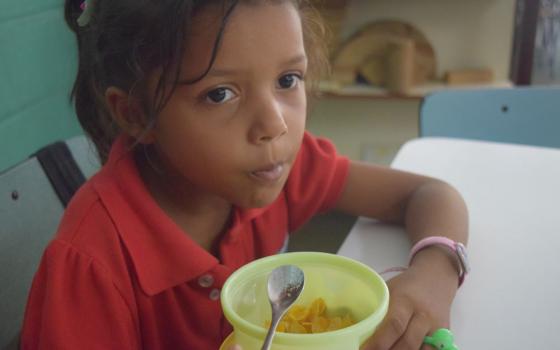At the Santo Angel School, an hour outside of the Venezuelan capital of Caracas, one might struggle to realize that the country continues to suffer through one of the worst economic crises in its history. At recess, the kids, ranging from ages 4 to 15, play and scream, oblivious to the difficulties so often mentioned by the adults around them.
But because the school is located in a low-income area most affected by the country's economic downturn, the effects of those difficulties have started to show for dozens of the school's 425 students. According the school's social worker, Sr. Blanca Griselis, a member of the Hermanas del Ángel de la Guarda, 35 students now regularly come to school with little or no food. The school asks parents to send students with a breakfast, and they leave school at 11:45 a.m., just before lunch.
A recent study by the Venezuelan chapter of Caritas Internationalis showed child nutrition rates approaching crisis levels in communities like Ocumare del Tuy.
As Griselis continued to notice more children without food and growing thinner, she set out to find a temporary fix to the problem. By securing a donation from a sister congregation in Spain, those students without food now receive their own arepa, a traditional Venezuela corncake.
Global Sisters Report sat down with Griselis at the school to discuss her life as a sister and her effort to keeping students fed and in class.
Before speaking about the current situation here at the school, I would like to know more about you. Where are you from, and how did you become a sister?
Griselis: I am from Guayanesa [from southeastern Venezuela] and was born in San Feliz in the beautiful Bella Vista barrio. In that area is where the congregation of the Hermanas del Ángel de la Guarda arrived, and they did a project where those of us in the community helped with a social project. I got to see how the young people organized themselves and how women also came together. I was impacted by the spiritual aspect of it all, which aimed to give our communities a spiritual base. It was in that small community that my Christian life was born.
My biological sister is also a nun and is part of the same congregation. My dad at first didn't like the idea that two of his daughters would become sisters. My dad said that poor people like us have to try and move forward by studying and graduating to move up in the world. But I always think about the lesson that God has come so that we have life and abundance. I repeat that lesson, which means that God is promising us an abundance in life.
Tell me more about your father's objections to you becoming a sister.
My parents had 12 kids, and their goal in life was for us to graduate and become professional.
Before entering the congregation, I had completed high school, and my dad always said I should go on to be an engineer. I graduated high school very young at 15 years old, and I started university.
And that's when I started to feel that call to look for God to serve others and to serve the most humble people. And when I told my parents that I was not going to continue with my degree and instead going to study to be a sister, my dad was very disappointed. He told me he didn't want that and that he had tried very hard so that we could grow up to not be poor, and then his daughter comes and tells him that she wants to go live with the poor people. It just didn't make sense to him.
Finally, a few years later, both my mom and dad started to understand that I was happy with what I was doing.
Did you know from a young age that you wanted to be a sister?
I was about 12 years old when I first started to become interested. I wanted to be a missionary and travel to different parts of the country, and so the sisters told me that I could be a sister in their congregation.
I asked them what they meant. They told me that I would be a nun. But I said, "No way, what about the parties and dances?" I liked to go to parties and dances at the time.
They told me, "Well, just check it out."
So I did just that. And I started the process with them and started to understand evangelism and to learn how to pray. But what I really liked was the social work we did and not necessarily a life tucked away praying.
I started with the congregational process in 1985. I was 16 years old when I first became a sister. And I just marked 29 years as a sister.
What is some of the work that has shaped you as a sister before your work here at the school?
I started out working in my community in Guayana. In those days, many of the people there didn't have nationality in any country. It was only the change in the constitution of 1961 that made all who are born in Venezuela Venezuelans. But in that time, if a child's parents didn't have documents, they couldn't become nationalized. So we worked so that 5,000 Guayanese children could have the Venezuelan identity even though their parents didn't have documents. We had to work with the bishops' conference, with the mayor's office, and the local registrar. So that was very interesting work.
Then I went to Bolivia, where I lived for four years. Those four years in Bolivia were some of the happiest years of my life. That's where I really learned that some people have less resources. It was much different than Guayana, where I had been. We had resources in Guayana, but in Bolivia, they had never even heard of a typewriter.
Arriving there and having to start working with people was a huge challenge. There weren't teachers who had been educated themselves. There were teachers who had just graduated high school and said they were somehow specialists.
Let's talk about your 10 years as a social worker here at the school. Comparing previous years to the past few, how have you seen the economic crisis have an impact in the community and at the school?
If I compare 2006 to today, I can say undoubtedly that before, the children came to class ready and willing to study and work. And the parents and guardians were willing to help out, as well. But right now, I am seeing that there are many children who are not motivated, and they say they prefer to stay home. It's often because there are problems at home. Sometimes it's that there isn't enough food, and when they hear that, they feel like they need to be home.
What exactly have you seen?
There are many situations where, for example, a child will be ashamed to bring a bit of yuca that is generally used for soup, or a little bit of pumpkin or even a banana for breakfast. They're embarrassed to say that's all they have for breakfast.
They're just bringing whatever they can find, and the kids are very embarrassed and say they just have a small bit of yuca. They are ashamed because the traditional breakfast here is an arepa, pastelito, or bread, but they almost never have that now.
How long have you been seeing this problem?
It has really become a serious problem just this year.
Are you seeing that the children are thinner?
Yes, some of them. But not only are they thinner. Before, we had a requirement of a uniform here, which is blue pants, a white shirt, black socks and shoes. Now kids will come and ask if they can come to school in sandals or with other types of shoes because they don't have enough money to buy shoes. We have always been strict with that requirement. We have always said that we may be poor, but we are clean and organized.
But now, the families aren't finding soap, and they don't have other cleaning materials. So the level of personal hygiene among the kids has declined, whereas before all of the children were clean and with their perfect uniform.
If kids can bring arepas, they have changed sizes from before. Before, they were big arepas. Now, they are very small. Sometimes, we will ask kids, "Why are you sad?" And they will say they are hungry.
How have you tried to resolve this problem?
When it became more common that parents and guardians would tell us that they don't have work and that they couldn't give them food or money to buy at the school cafe, we started realizing that we really needed to do something.
More families came to us to tell us that they didn't have anything to eat and that if they send their kid to the school, they have to send them without having eaten or without food. They would ask what they should do. I always told them, "Send them to school." I said, "Here, we will figure out what we can do to fix this situation."
That was our new policy: that kids come to school. Some kids had started missing whole weeks. And we would ask their parents why they hadn't been to school, and they would say because they didn't have food to send with them.
Since we are an international congregation, and in Spain there are other schools, the kids in Spain said they wanted to help Venezuela. They asked us how they could help. And we told them that we needed food.
So there in Spain, they said they were going to start a campaign to help. And with that first donation, we have been able to give those kids who don't have food a breakfast. With 1,000 euros, we have been able to feed the kids since December.
I also met with the parents and guardians, and I told them that for us as an institution, we are interested in having the kids here at the school, and you want your kids to be here. So I said, "Let's do a 50-50 deal."
I said, "We will get all of the supplies, the flour, the protein, meat, chicken, and you guys will help us make the arepas." And that's how we have been doing it. And with that help from the parents, we don't have to pay someone to make the food, so that has helped make the first donation last until now.
How do you know which kids are not eating properly?
Normally, it's the teachers who can see if there is a problem, which they will see during class. And since I am the social worker, they come to me and tell me, "This kid is coming sad, she doesn't say anything, and when she comes, she sleeps on the desk."
We will look into it, and when we start to investigate, we see that the child is not eating because in her house, they aren't able to buy food.
We often see mothers who don't necessarily grasp reality. They will pretend that they actually do have food to give the kids, and the kid will come and say it's just a strip of yuca that they have, and they don't like yuca. And I tell them not to worry, that we have their arepa. And she gets the arepa.
[Cody Weddle is a freelance journalist based in Caracas, Venezuela. Follow him on Twitter: @coweddle.]
